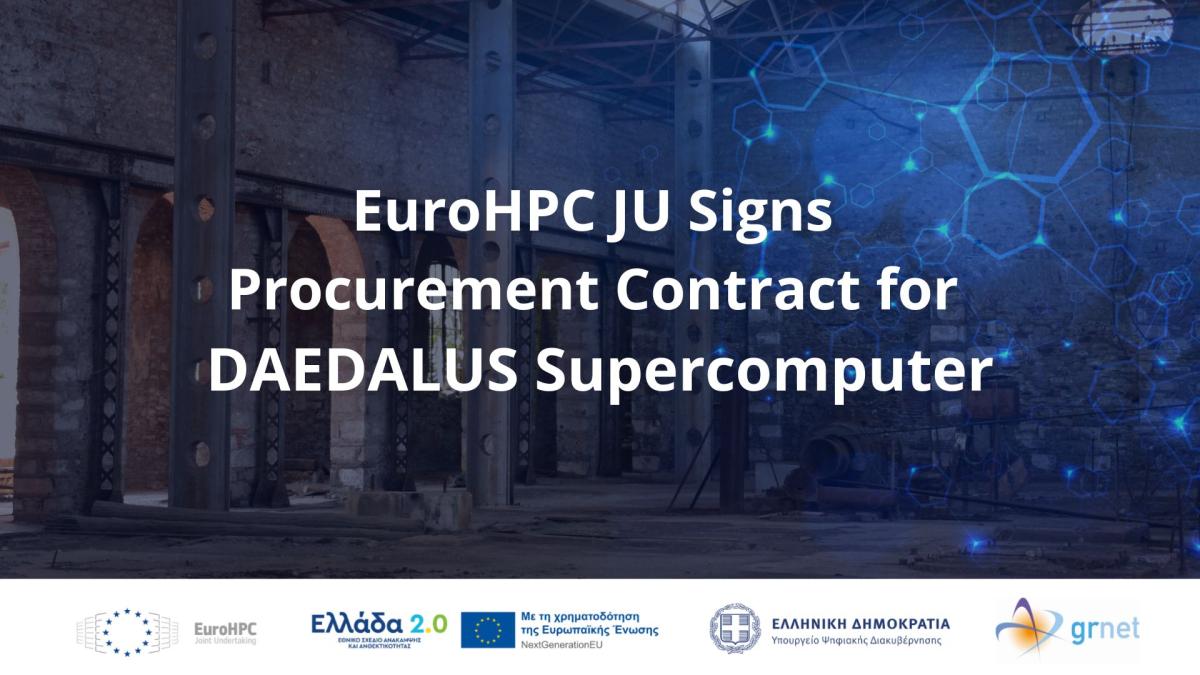The start of the implementation of DAEDALUS was announced earlier this week by the Greek Minister of Digital Governance, Dimitris Papastergiou, during an offical event at the Lavrion Technological Cultural Park, where the new supercomputer will be built.
DAEDALUS will be a mid-range supercomputer capable of executing over 89 petaflops or 89 million billion calculations per second. This world-class supercomputer will be further enhanced by Pharos, one of the upcoming EuroHPC AI Factories, enabling DAEDALUS and Pharos to drive European innovation and support scientific advancements across various fields including artificial intelligence, medicine, meteorology, big data analysis and the development of smart transport systems.
The DAEDALUS supercomputer will be accessible in early 2026 to a wide range of users across Europe including the scientific community, industry and the public sector. Access to its computing resources will be jointly managed by the EuroHPC JU and the DAEDALUS consortium in proportion to their investment.
As the EuroHPC JU strives to procure green supercomputers, DAEDALUS will be no exception, using renewable energy sources and advanced cooling systems that will significantly reduce its energy consumption.
DAEDALUS is co-funded with a total acquisition cost of EUR 36 million. The EuroHPC JU will fund 35% of the total cost of the new system, while the other 65% will be funded by the National Recovery and Resilience Plan ‘Greece 2.0’. Cyprus, Montenegro and North Macedonia are also involved in the project as members of the DAEDALUS consortium.
The system will be managed and operated by GRNET S.A, the National Infrastructures for Research and Technology, in Athens, Greece, operating under the auspices of the Greek Ministry of Digital Governance. It will be installed in the new data centre located in the building of the former Power Station of the Lavrion Technological Cultural Park of the National Technical University of Athens.
Anders Jensen, EuroHPC JU Executive Director, said:
“DAEDALUS is the 10thsupercomputer procured by EuroHPC JU, further supporting our mission to provide European scientists and industry with access to cutting-edge HPC infrastructures and services. I look forward to seeing this new system become operational next year and to its integration into Pharos, one of our new AI Factories.»
Background
HPE has been selected following a call for tender launched in June 2024.
The European High Performance Computing Joint Undertaking (EuroHPC JU) is a legal and funding entity, created in 2018 and reviewed in 2021 by Council Regulation (EU) 2021/1173 to enable the European Union and participating countries to coordinate efforts and pool resources with the objective of making Europe a world leader in supercomputing.
In order to equip Europe with a world-leading supercomputing infrastructure, the EuroHPC JU has already procured nine supercomputers, located across Europe. Regardless of their location in Europe, European scientists and users from the public sector and industry can benefit from these EuroHPC supercomputers via the EuroHPC Access Calls. This access enables them to advance science and support the development of a wide range of applications with industrial, scientific, and societal relevance for Europe.
Recently reviewed by means of Council Regulation (EU) 2024/1732, the EuroHPC JU received a new mandate to develop and operate AI factories. These comprehensive open AI ecosystems located around EuroHPC supercomputing facilities will support the growth of a highly competitive and innovative AI ecosystem in Europe. In December 2024, the EuroHPC JU selected the sites that will host the first European AI Factories in Finland, Germany, Greece, Italy, Luxembourg, Spain and Sweden. In March 2025, the EuroHPC JU has selected six new sites across Europe to host additional AI Factories in Austria, Bulgaria, France, Germany, Poland, and Slovenia.
In parallel, the EuroHPC JU funds research and innovation projects to develop a full European supercomputing supply chain: from processors and software to applications to be run on these supercomputers and know-how to develop strong European HPC expertise.
